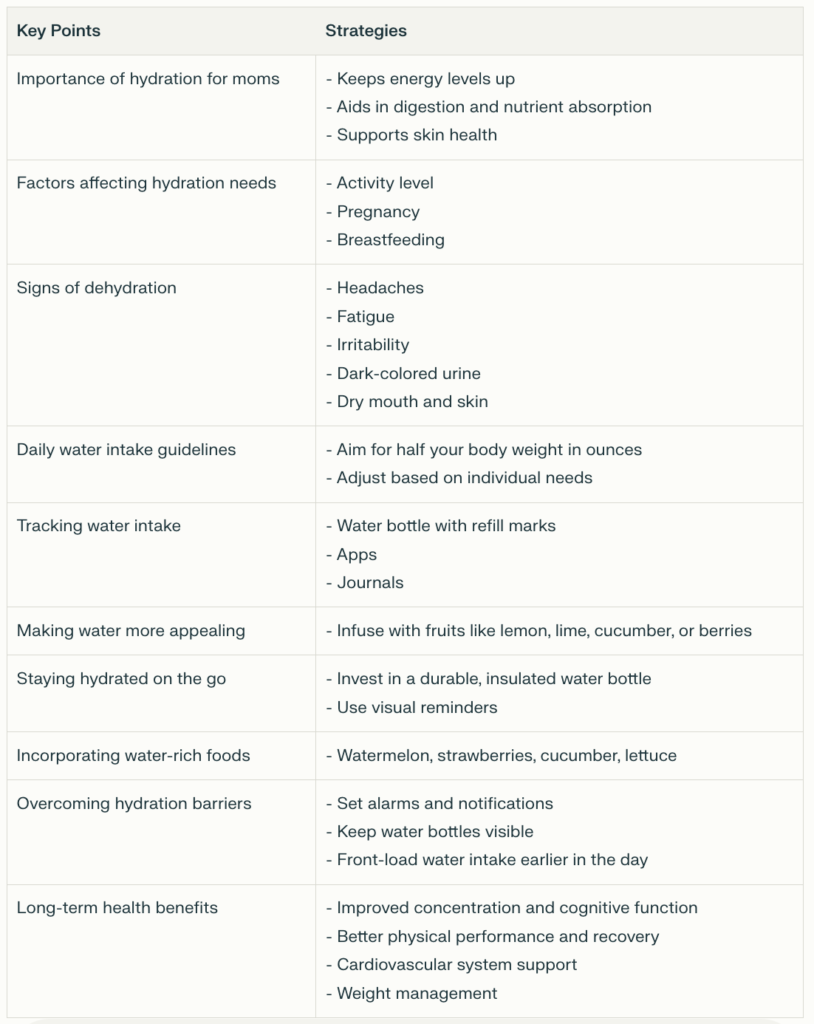Key Takeaways
- Hydration is crucial for moms for overall health, energy levels, and aiding in bodily functions.
- Every mom’s hydration needs are different, depending on factors like activity level and whether they are pregnant or breastfeeding.
- Simple strategies like keeping a water bottle handy and eating water-rich foods can significantly improve hydration.
- Recognizing the signs of dehydration can help moms take quick action to rehydrate.
- Staying hydrated has long-term health benefits, including better physical performance and aiding in recovery.
Why Hydration Matters for Moms
As a mom, you’re constantly on the move – juggling family, work, and personal time. With such a busy schedule, it’s easy to forget about your own needs, like staying hydrated. But here’s the thing: water isn’t just important; it’s essential for your body to function properly. It helps with digestion, absorption of nutrients, and even skin health. And most importantly, it keeps your energy levels up so you can keep up with the little ones.
Understanding the Role of Water in Mom’s Health
Water does more than quench thirst; it’s a vital player in maintaining your health. It helps regulate your body temperature, which is especially important if you’re running around all day. It also supports your joints and tissues, keeping you flexible and less prone to injury. Because you lose water every day through breath, sweat, and urine, it’s crucial to replenish your body’s supply constantly.
The Risks of Dehydration for Busy Moms
Ignoring your thirst can lead to dehydration, which can sneak up on you with symptoms like headaches, fatigue, and even irritability. This can make your daily tasks feel more challenging. In the long run, chronic dehydration can contribute to more serious issues like kidney stones and urinary tract infections. Therefore, it’s key to listen to your body and hydrate regularly.
Setting the Foundation
Daily Water Intake Goals for Moms
So, how much water should you be drinking? While the ‘8 glasses a day’ rule is a good starting point, your actual needs may vary. A good rule of thumb is to aim for half your body weight in ounces. For example, if you weigh 150 pounds, that’s 75 ounces of water a day. And if you’re pregnant or breastfeeding, you’ll need even more to support your baby’s health.
But remember, every mom is unique. Your water needs will also depend on your activity level, the climate you live in, and your overall health. Listening to your body is the best way to gauge if you’re getting enough water.
Identifying Personal Hydration Needs
Start by checking the color of your urine. If it’s light and pale, you’re probably well-hydrated. If it’s dark, you need to drink more water. Also, pay attention to how often you’re thirsty and whether you’re experiencing dry mouth or dry skin – these can all be signs that your body needs more water.
Another way to identify your hydration needs is to monitor how you feel during exercise. If you’re feeling dizzy or more tired than usual, it might be a sign to increase your water intake. Besides that, if you’re breastfeeding, you might notice you’re thirstier than usual – that’s your body telling you it needs more fluids to produce milk.
1. Tracking Your Intake: Simple Methods
Keeping track of how much water you drink can be a game-changer for your hydration habits. Start with a simple water bottle and make a mark for every refill you drink. There are also plenty of apps available that can remind you to take a sip and log your intake. Or, keep it old school with a journal – jot down each glass of water you drink. It’s all about finding what works for you and sticking with it. For more time management strategies, check out our tips for busy mothers.
2. Infusing Fun: Making Water Appealing
Let’s face it, water can be a little… boring. But it doesn’t have to be! Infuse your water with slices of fruits like lemon, lime, cucumber, or berries to add a splash of flavor. Get creative and try different combinations to find your favorite. Not only will it taste better, but you’ll also look forward to hydrating. Plus, it’s a fun way to introduce kids to healthy habits by letting them pick the flavors.
3. Water on the Go: Staying Hydrated Throughout the Day
For moms who are always on the move, having water available wherever you go is key. Invest in a durable, insulated water bottle that can keep your water cold for hours. Make sure it fits in your car’s cup holder and your bag. And, whenever you leave the house, take it with you – it’s as essential as your keys or phone.
Another tip is to use visual reminders. Place bottles or glasses of water in the places you frequent the most – like your desk, the kitchen, or beside your bed. Seeing water around will prompt you to take more sips throughout the day.
And don’t forget to hydrate before, during, and after exercise. Even mild dehydration can impact your workout performance and recovery. So, keep a bottle nearby whenever you’re getting active, and take breaks to drink, even if you’re not feeling thirsty yet.
4. Eating Your Water: Hydration Through Foods
You don’t have to rely solely on drinking water to meet your hydration needs. Many fruits and vegetables are packed with water and nutrients that help you hydrate. Watermelon, strawberries, cucumber, and lettuce are all more than 90% water. So, incorporate these into your meals and snacks. Soups and broths are also a tasty way to boost your fluid intake, especially during the cooler months.
Navigating Obstacles to Hydration
Even with the best intentions, sometimes life gets in the way of staying hydrated. Maybe you’re too busy to remember to drink water, or you’re simply not in the habit. Recognize what’s holding you back so you can address it head-on.
And remember, it’s not just about drinking water. Limiting diuretics like caffeine and alcohol can help you retain more of the fluids you do consume. These beverages might give you a temporary boost, but they can also lead to increased water loss over time.
Overcoming Common Barriers
Time and forgetfulness are two of the biggest barriers to staying hydrated. To combat this, set regular alarms or notifications to take a drink. Keep your water bottle in sight as a visual cue. And if you’re worried about frequent bathroom trips, try to front-load your water intake earlier in the day so you can taper off as bedtime approaches.
- Set alarms on your phone to remind you to drink water.
- Keep your water bottle visible and within reach.
- Start your day with a large glass of water to kickstart hydration.
- Choose water-rich foods to help meet your hydration goals.
- Reduce intake of diuretics like caffeine and alcohol.
It’s also worth noting that sometimes, we mistake thirst for hunger. If you’re feeling peckish, try drinking a glass of water first. You might find that it’s just what you needed.
Another barrier might be taste – if you’re not a fan of plain water, the infusion tip mentioned earlier can really help. Also, consider sparkling water or adding a splash of juice for a little extra flavor.
Staying Motivated and Creating Habits
Motivation can wane, but habits stick around. Start small, like drinking a glass of water first thing in the morning or right before every meal. Once these actions become second nature, you’ll find it easier to stay hydrated without even thinking about it. Celebrate your progress along the way – every step towards better hydration is a win for your health.
Health Benefits: Beyond Quenching Thirst
Hydration goes beyond just avoiding the downsides of dehydration. It has real, tangible benefits for your health. Drinking enough water can improve your concentration and cognitive function – crucial for those days when you’re multitasking non-stop.
The Long-Term Payoff of Consistent Hydration
Consistently staying hydrated can also lead to better physical performance. You’ll have more stamina and energy to tackle your day, and you’ll recover faster from any activity. It’s not just about the immediate effects; proper hydration can contribute to long-term health benefits, like maintaining kidney health and preventing urinary tract infections.
Moreover, hydration supports your cardiovascular system. When you’re well-hydrated, your heart doesn’t have to work as hard to pump blood throughout your body. This can help you feel more at ease and less stressed – something every mom can appreciate.
Hydration’s Impact on Physical Performance and Recovery
Hydrated muscles perform better. That’s a fact. When you’re well-hydrated, your muscles have the fluids they need to work effectively. This means you can play with your kids, carry groceries, or hit the gym with less risk of muscle cramps and fatigue. Hydration also aids in recovery post-exercise, so you can bounce back quicker and with less soreness.
Another often overlooked benefit is that proper hydration can help with weight management. Water can help you feel full, reducing the likelihood of overeating. And a well-hydrated body can burn fat more effectively and maintain muscle tone.

FAQ
How much water should a nursing mother drink each day?
A nursing mother should aim to drink more water than the average adult. While the standard recommendation is about 9 cups (just over 2 liters) of water daily for women, nursing mothers may need about 12 cups (around 3 liters). This accounts for the extra fluid needed to produce milk. Keep in mind that this is a general guideline and personal needs may vary.
Can certain foods contribute to hydration?
Absolutely! Many fruits and vegetables have high water content and can contribute to your overall fluid intake. Foods like cucumbers, watermelon, oranges, and strawberries are made up of over 90% water. Including these in your diet can help you stay hydrated and provide essential vitamins and minerals.
What are the signs of dehydration to watch out for?
Signs of dehydration include feeling thirsty, having dark-colored urine, feeling dizzy or lightheaded, having a dry mouth, feeling tired, and experiencing headaches. If you notice these symptoms, increase your water intake and, if necessary, consult a healthcare provider.
Are there any times when I should increase my water intake?
Yes, there are several instances when you should drink more water. If you’re exercising, in a hot climate, running a fever, or experiencing diarrhea or vomiting, your body will need additional fluids. Also, during pregnancy and breastfeeding, your water requirements are higher.
What if I don’t like the taste of plain water?
If plain water isn’t appealing to you, try adding natural flavorings like lemon, lime, or cucumber slices. Herbal teas and coconut water are also hydrating alternatives. Just be cautious with sugary drinks, as they can add extra calories and lead to other health issues.
Option A.



Leave a Reply